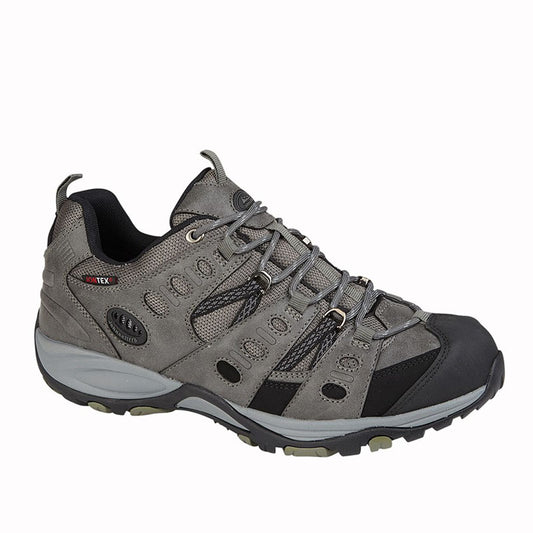-
Mens Johnscliffe Grey/Black Hiking Multi
Regular price £60.00 GBPRegular priceUnit price / per
Choosing hiking shoes involves considering several factors to ensure they fit well and provide comfort and support during hikes. Here's a guide:
Opt for a snug but not tight fit. They should feel secure around your heels and provide ample room for your toes, preventing blisters or discomfort. Try them on with hiking socks to replicate the actual hiking conditions.
Look for shoes with solid ankle support, especially for rough terrains. High-cut boots offer more ankle support, while low-cut shoes are lighter and more flexible. Choose based on the type of hiking you'll be doing.
Quality materials like leather, synthetic blends, or Gore-Tex provide durability and water resistance. Ensure they're breathable to prevent moisture build-up, which can cause blisters.
A sturdy sole with a good grip is essential for various terrains. Check the outsole pattern and material to ensure they offer proper traction on both dry and wet surfaces.
Look for ample cushioning in the midsole to absorb shock while walking. Comfort features like padded collars and tongues, as well as a cushioned footbed, contribute to overall comfort.
Lighter shoes are generally more comfortable for day hikes and less strenuous trails. Heavier boots might provide more support but can feel cumbersome on shorter hikes.
Ensure you have enough time to break in your hiking shoes before embarking on a long hike. Wear them around the house or on shorter walks to let them mold to your feet.
Comfort in hiking shoes is influenced by:
Proper Fit: A good fit minimizes the risk of blisters or discomfort.
Cushioning: Adequate padding and cushioning in the midsole and footbed offer shock absorption.
Supportive Structure: Ankle support, arch support, and a well-structured sole provide stability and reduce fatigue.
Breathability: Shoes that allow airflow help keep your feet dry and comfortable.
Appropriate Socks: Pair your hiking shoes with moisture-wicking, comfortable socks to enhance overall comfort and prevent blisters.
Ultimately, choosing the right hiking shoes involves balancing your hiking needs, the terrain, and personal preferences for comfort and support. Trying on several pairs and considering these factors will help you find the best fit for your hiking adventures.

